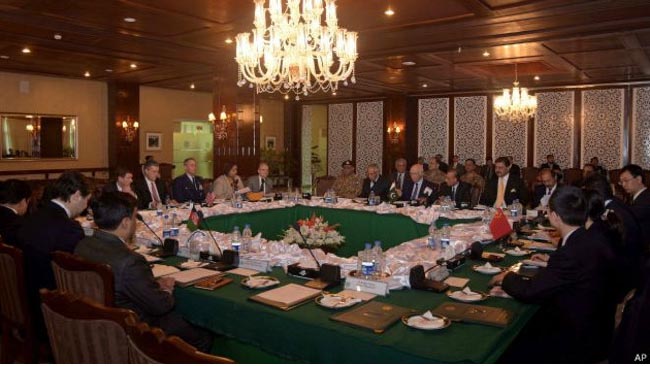Holding out against peace negotiation, militancy continues unabated in Afghanistan which undermines the burgeoning democracy and curtails individual and collective freedoms. Peace has remained a dream that never comes true for Afghan nation. There is a sense of fear and mistrust in the air and the gleam of hope for peace talks has disappeared. The Taliban fighters are wounded by the death of Mullah Akhtar Mansour, who was killed in US drone strike in the Dalbandin area of Balochistan on May 21, and, therefore, intensify their attacks.
The negotiation of peace between Afghanistan and the Taliban had reached deadlock several times within the last decade. The prominent stalemates in this process are Mullah Omar’s death, which was revealed on late July 2015, and his successor Mullah Mansour. Omar’s death prompted the Taliban outfit to stage “Operation Omari” against the U.S. and Afghan soldiers with stronger determination than before. To put it succinctly, the sudden demise of the Taliban’s Emir-ul-Mumineen (Commander of faith) was an irreparable loss for the Taliban which triggered a rift between his fighters. Subsequently, a number of the Taliban militants pledged allegiance to the self-proclaimed Islamic State of Iraq and the Levant (ISIL) to fill the vacuum of their spiritual leader by Abu-Bakr al-Baghdadi – the ISIL’s Caliph.
On the other hand, Mansour claimed to fill Omar’s vacuum. However, his succession led to splinter group and widened the gap between the Taliban elements. Splits also emerged between Mansour and those who challenged his appointment, including the late leader’s son Yaqub and his brother, Mullah Abdul Manan, and also Mullah Mansour Dadullah.
Loyal to Akhtar Mansour killed Mullah Mansour Dadullah, his brother and dozens of his fighters, for not pledging allegiance to Omar’s successor, in Zabul province – which enraged Omar’s family. Dadullah, who was leading a Taliban’s faction, was of the view that Omar’s sons should lead the Taliban. Finally, religious scholars close to the Taliban brokered a ceasefire between Mansour and the rival faction under Mullah Mohammad Rasool.
After all, Omar’s successor staged heavy attacks against Afghanistan to consolidate his position. Although his death was a blow to peace process, he did not carry much weight among the Taliban. Contrary to public belief, the Taliban announced Mawlavi Haibatullah Akhundzada as Mansour’s successor without disagreement.
Following all the interminable ebbs and flows, now the peace process is moribund. There is lack of trust not only between the negotiators but also among the members of the Quadrilateral Coordination Group (QCG), mainly after Mansour’s death. In late May, a fifth round of four-nation talks aimed at laying the ground for a negotiated end to the Afghan war began in Islamabad, but hopes faded away for bringing the Taliban insurgents to the table quickly.
However, there are still sporadic calls for peace. As a result, U.S. Special Representative for Afghanistan and Pakistan Richard Olson said, “Taliban should not keep away from talks, hoping that the U.S. is going to abandon Afghanistan.” The militant outfit should not suspect the genuineness of America’s support for the Afghan-led peace talks that the U.S. continued to support, he told an audience at the Atlantic Council, a Washington-based think-tank. He further added that Washington expected the QCG to use their leverage to drive the Taliban to the negotiating table. According to him, Pakistan would not have a “bright future” unless it took action against terror groups like the Afghan Taliban and the Haqqani network and commended Pakistan’s counter-terrorism operations in the tribal region of Waziristan.
Despite the complicated issue of peace, the recent call for talks by a hegemonic member of QCG bespeaks of the open door of negotiation for the Taliban’s newly appointed leader Mawlavi Haibatullah. On the surface, Mansour’s death seemed to facilitate the peace talks as he was deemed an “obstacle” before the peace process. But the appointment of Haibatullah, who is known for his radical decrees, caused a disappointment. Since Haibatullah did not opine regarding peace talks and his stance seems unclear, he is called to fill the empty seat of his predecessor around the negotiating table.
Of late, the UN secretary-general’s special representative Nicholas Haysom said the battlefield in many areas of Afghanistan was in a state of flux, with gains and reversals but with neither side effecting clear dominance. Indeed, Afghan civilians have been suffering the Taliban’s unmitigated militancy for more than a decade and it never ends. It is a matter of great concern to see that the high level of violence is having on the civilian population. “There has been no let-up in Ramadan, during which period there have been some reports of disturbing brutality, including attacks on worshippers,” Haysom is cited as saying. He said Afghans could meet the challenges confronting them. “It is possible for Afghanistan not only to survive in 2016, but to grow stronger as a result.”
Perhaps, Haibatullah is still hesitating over participation in peace talks. His deputies Sirajuddin Haqqani and Mullah Omar’s son Mullah Yaqoob will have a profound influence on him and might speak the final words. It should be noted that Sirajuddin Haqqani, who is labeled as “specially designated global terrorist” by the U.S. State Department, will be the key player in peace process and will play the role of wolf and fox since he has been a political mastermind behind a number of deadly scenes.
Home » Opinion » Hope for Peace Talks?
Hope for Peace Talks?
| Hujjatullah Zia

